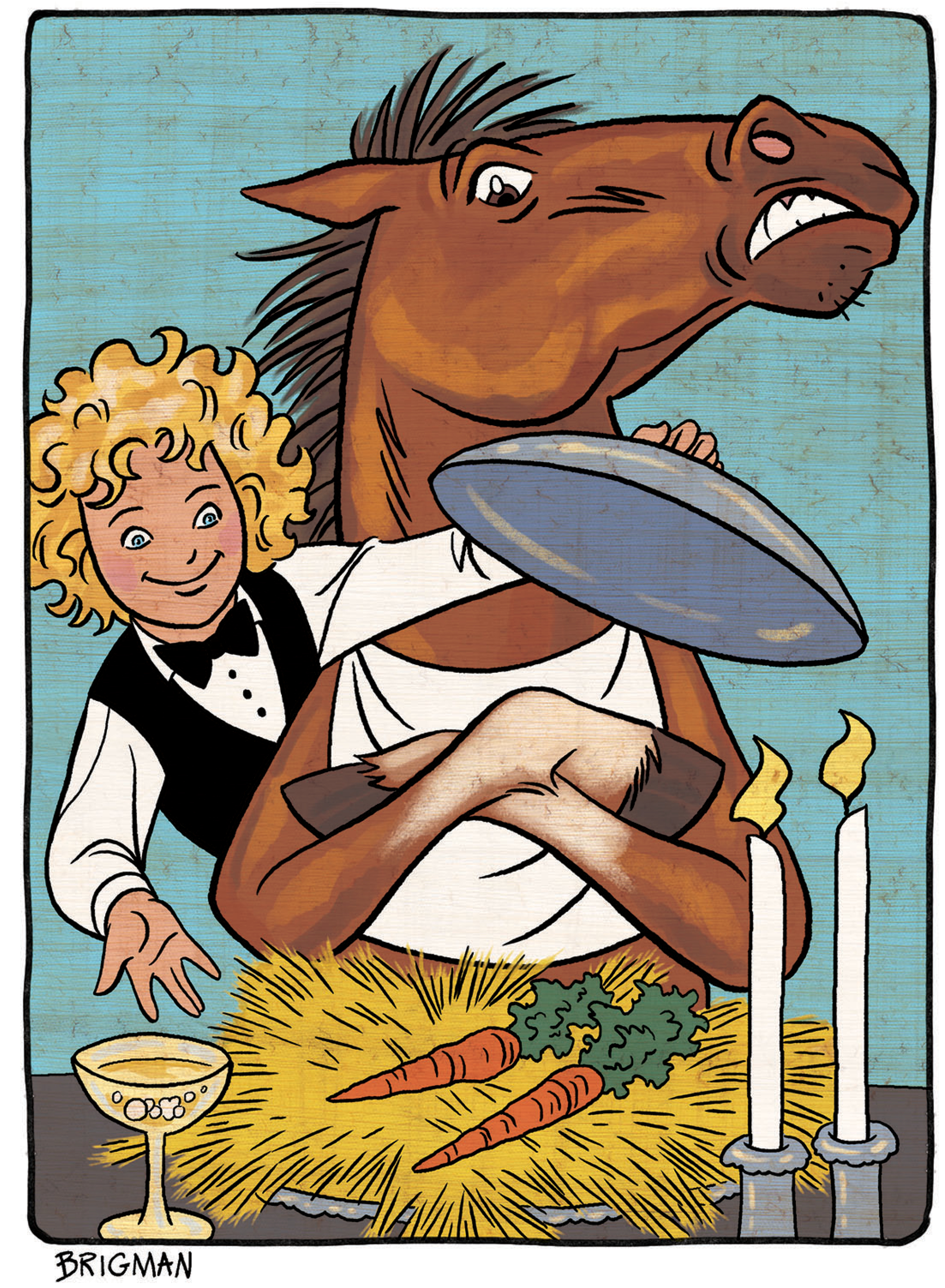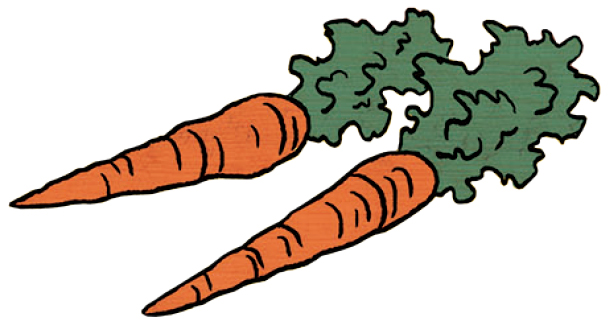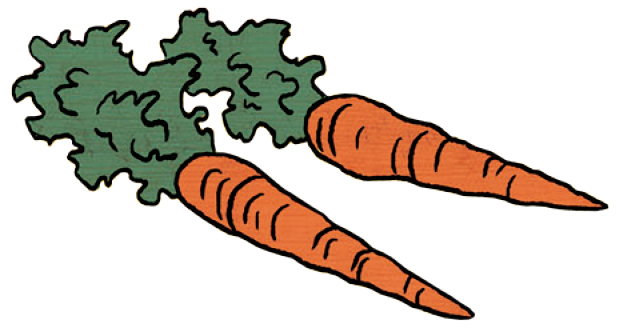What Can I Feed My Horse From My Kitchen I Ran Out of Hay

There you stand in your feed room, scratching your head and trying to concoct the perfect meal for your hard keeper. Last week he loved the bale of expensive grass hay you brought home from the feed store, but now that you've stacked two tons of it in your barn, your finicky eater seems to have changed his mind.
[MORE ABOUT: Horse Feeding Program]
It's the same problem with his grain and pelleted feeds—he seems to prefer a different product every week. It wouldn't matter if he were fat, but his picky eating habits keep him skinnier than you'd like. In fact, last week one of your barn buddies even commented on how thin he looked. What can you do?
It's a challenge! And that's why I say give me a fat horse any day. Calorie restriction, dry-lot turn-out, and a grazing muzzle might feel like horse abuse, but at least you can influence his eating. On the other hand, trying to get a skinny, picky horse to eat? That's another story. Because, just as with water, you can lead a horse to food but you can't make him eat!
Here, I'll help you devise an approach for managing your hard keeper. First, you'll make sure there's no underlying problem causing him to say no at feeding time. Once you've determined he's truly just plain picky, I'll give you 10 tips to help encourage him to eat.
Finally, if all else fails, we'll take a look at medications and supplements that might (or might not) help stimulate his appetite.
[MORE ABOUT: Reading a Feed Tag]
What Could Be Wrong
Before embarking on a plan to get your finicky horse to eat, be sure there's nothing actually wrong with him—especially if his pickiness is new. In fact, before you even call your vet, take a minute to check the feed itself (is it moldy, rancid, or otherwise tainted?) and the feeding environment (is his feed tub dirty or contaminated with something that tastes terrible?).
I've seen owners perplexed by a horse's sudden pickiness…then discovered a dead rat in the barn wall by his feeder or an exposed electrical wire that's been zapping the poor horse every time he approaches his feed tub. (True stories.)
But if the feed and environment check out, do call your vet. He or she will perform a complete physical exam to see if anything's physically wrong with your horse. Even something as simple as chronic musculoskeletal pain can cause a horse to refuse his food.
Here are just a few of the potential causes of your horse's poor appetite.
Organic disease. Your horse is experiencing illness related to a major body organ such as his liver or kidneys. His weight loss may seem more pronounced than you'd expect him to have simply because of a loss of appetite. He could also exhibit other signs, such as intermittent colic, excessive drinking and urinating, or just plain depression.
If your vet doesn't find anything specific on a physical exam, the next step is basic lab work that might identify the organ involved, followed by additional diagnostics to help pinpoint the problem. Treatment of your horse's underlying disease (if it's treatable) would be crucial for his future health—and his appetite.
Dental disease. Your horse has a loose tooth, gum disease, or something as simple as a sharp point that's causing discomfort when he eats. It's sometimes possible to identify a horse with a dental problem simply by watching him; he'll act hungry and might even dive enthusiastically into his meal, but once he starts chewing and experiences pain, he'll back off and refuse to eat.
You might also notice that he spits out food instead of chewing and
swallowing. If he has a more serious dental disease that's making him feel sick, he'll be less enthusiastic and pickier about his meals in general.
To accurately diagnose a dental problem, your vet will sedate your horse and use a full-mouth speculum—a large metal device that holds his mouth open for access to all areas.
Many dental problems can be solved reasonably easily, putting an end to your horse's picky eating once and for all. A more complicated or long-term dental problem might require special feeding, but at least you'll know what dietary adjustments you need to make.
[MORE ABOUT: Equine Dental Care]
Gastric ulcers. Your horse has inflammation and erosion of the tissues lining his stomach, and these conditions cause pain when he eats. Many symptoms—ranging from girthiness and poor performance to chronic colic, poor appetite, and weight loss—are blamed on gastric ulcers. But the only sure way to diagnose this problem is with gastroscopy, an endoscopic examination of your horse's stomach.
For this procedure, your horse will be kept off food overnight so your vet can pass a long, flexible tube with a camera at its tip down into his stomach. If your horse is a picky eater, gastroscopy is a reasonable step to take, because if he does have ulcers, medication and changes in management will likely improve his appetite.
[MORE ABOUT: Horse Gastric Ulcers]

What You Can Do
If it turns out there's nothing physically wrong with your horse, you'll be back at your feed-room door, scratching your head and wondering what comes next. The following 10 tips might help.
Tip #1: Feed calorie-dense food. Make every bite count. Choose feed options that offer the most "calories per bite" possible, such as alfalfa hay over a low-calorie grass alternative, or a senior ration over plain oats.
You can also consider including calorie-rich additions, such as a cup of oil or other high-fat feed, to his regular ration. (Be aware, however, that many picky horses don't appreciate the taste of oil—and if he won't eat it, the calories won't help.)
T ip#2: Mind the palatability. If you want your horse to eat, be sure to offer something "yummy." Most horses prefer lush, green, high-quality hay over options that are stemmy or dry. (And, as an added benefit, those high-quality hays typically offer more calories per bite.)
When selecting a high-calorie concentrate ration, don't fixate on avoiding products with molasses or other tasty additives. In this case, it's better for your horse to have a little sugar than to refuse food altogether.
Tip #3: Watch the yuck factor. On the flip side of ensuring that his meal is "yummy," be equally sure not to add anything "yucky" to your picky horse's ration. If you top-dress with a supplement or medication that tastes bad, he may turn up his nose at the entire meal. Even administering a bad-tasting medication (such as bute) an hour or more before feeding time can cause your picky horse to refuse his food.
As an alternative, consider administering supplements and medications at times of day not associated with meals, and give them directly via syringe—ideally mixed with something delicious, such as molasses, applesauce, or cake batter.
Tip #4: Offer options. Just like a toddler, your horse may like one type of feed for a week or two, then decide he prefers something else instead. If he's really trying to keep you guessing, he'll change his mind faster than you can make it to the feed store and back. Such horses will also often eat a little bit of one of the foodstuffs before them, then tire of it quickly and move on to something else.
For a horse like this, it might help to offer a variety of options at feeding time. For example, several different types of high-quality hay, a calorie-dense senior ration, supplemental beet pulp, and some kind of hay "chop" are all options you might consider.
Tip #5: Play hardball. If you've offered options and he still says no, it might be time to take the opposite approach. Offer one meal choice with a message to your horse that he can "take it or leave it." Choose whatever high-calorie, palatable feed your horse seems to like best, and offer that and nothing else. Some horses respond well to this approach—if they're hungry enough, they'll start to eat.
Tip #6: Separate and protect. Is your picky eater living in a herd environment? Is he at the bottom of the pecking order? If so, he may be afraid to eat. On top of that, by the time he works up the nerve to try, his more aggressive herd-mates are likely to have cleaned up every scrap. So pay attention to the dynamics in your herd, and separate your horse at feeding time if that's what he needs.
Tip #7: Consider competition. On the other hand…if your horse lives alone and is fed in an isolated stall, it might help to make him feel a little competition at feeding time. In the wild, food is a limited resource and the horse that gets enough to eat is the one that survives.
Set up an environment where your picky eater can view a horse stabled next door at feeding time and see if that stimulates his instincts to eat. If that's not possible, consider installing a non-breakable mirror next to the feeding area in his stall—his own reflection might prompt him to grab some grub.
Tip #8: Clean it up. Remove any old hay or feed left behind from the previous meal. If you're feeding coarse hay with lots of stems and your horse eats the green, leafy parts but leaves the stems behind, guess what? He's not going to eat those stems no matter how long you leave them there. Ditto powdery, broken-down old pellets at the bottom of his feed bucket.
Plus, if you leave that old feed in his stall or bucket long enough for it to get damp, moldy, and stinky, it's likely to make your picky horse even pickier. This is the most common feeding mistake I see—and one of the easiest to solve. Always clean up your horse's left-behind feed before you put out more.
Tip #9: Offer soft music, candlelight. Have you ever seen a horse drag all his feed out of his stall and into his outside paddock before he'll eat? He's saying he prefers to eat in a quiet, unlit environment. Observe your horse closely to see if he seems to eat better in the corner of his stall, out in his paddock, or in some other specific location. Do you put his hay in a feeder? Try putting it on the ground instead.
With a little trial and error, you may discover your horse has definite preferences about his meal-time environment. If so, a change of venue may help overcome his pickiness.
Tip #10: Go back to nature. Even the pickiest eater will usually find it hard to turn away from fresh, green pasture. If all else fails and it's available, consider turning your horse out on grass. On good pasture, he'll benefit not only by having a high-quality, calorie-packed source of feed that provides for most of his nutritional needs, but also by enjoying turn-out time that boosts his physical and mental wellbeing.
[MORE ABOUT: Feeding a Special Needs Horse]

SIDEBAR
Appetite Stimulants?
Shouldn't there be a magic pill or supplement you can give your horse to encourage him to eat? A quick Google search suggests a lot of possibilities. The real question, though, is how effective they'll be.
For insight, I ran those Google-search possibilities by Dr. John Schlipf, a veterinary internal medicine specialist at Oregon State University. He says stimulating appetite in critical-care patients is one of his most challenging problems.
Here's what I found out.
Benzodiazepenes
What are they? Benzodiazapenes (diazepam or Valium and midazolam or Versed) are anti-anxiety medications that work on neurotransmitters in the brain. Commonly used in humans with anxiety and panic disorders, seizures, and insomnia, benzodiazepenes can be highly addictive.
The inside scoop. These medications will often work to boost appetite in the short term, but they aren't really practical for long-term use because they require injection and are controlled substances heavily regulated by the FDA.
If you simply need to jump-start your horse's eating when he's not feeling well, your veterinarian could turn to one of these medications, but they're not likely to be useful for your longtime picky eater. "I like midazolam as it's less expensive and seems to be effective," explains Dr. Schlipf, "but only for the short term."
Cyproheptadine
What is it? Cyproheptadine is an antihistamine used to treat allergy symptoms in humans. It also blocks serotonin, a substance that can act as a neurotransmitter. In horses, cyproheptadine can be effective for controlling headshaking syndrome and has been used to treat Cushing's disease.
The inside scoop. This medication can be a weak appetite stimulant in children. It's been used in cats for this purpose, as well, which led to the suggestion that it might work in horses. "I've not seen any effect, and I don't use it," says Dr. Schlipf.
B Vitamins
What are they? These water-soluble vitamins have many important functions in the body. They play a role in nervous-system function, and in humans are believed to help relieve symptoms of depression and anxiety.
The inside scoop. B vitamins aren't going to hurt your horse, and because they're water-soluble they aren't stored in the body—meaning any excess is eliminated. As an appetite stimulant, however, "B vitamins have very marginal effects," states Dr. Schlipf.
Fenugreek
What it is? Fenugreek is a cooking-spice herb that's gained popularity for treating almost everything in humans from erectile dysfunction to kidney disease. It does slow absorption of sugars and stimulates insulin release, which may have some benefits for managing diabetes.
Its taste is similar to that of maple sugar, and it's commonly used as a flavoring in imitation maple syrup, some beverages, and tobacco.
The inside scoop. Fenugreek appears to have few negative effects, and there are many anecdotal reports from horse owners that it has helped encourage their picky horses to eat—perhaps in part because of its taste. Although Dr. Schlipf does use fenugreek in his kitchen as a spice, he's never tried it as an equine appetite stimulant.
Anabolic steroids
What are they? Anabolic steroids (boldenone and stanozolol) are related to the male sex-hormone testosterone, and they're commonly used (and abused) by human athletes to build strength and muscle mass.
The inside scoop. Once commonly used for horses, these drugs are now approached with caution. They can have long-term effects—including stimulating aggression and dominant behavior—as well as negative impacts on major body organs like the liver and kidneys.
That said, they can also be effective at stimulating appetite, and Dr. Schlipf does use them for this purpose—especially for horses with severe diseases, like cancer, that need palliative care.
"There's a risk in using them, without doubt," he states, "but they've really helped some horses."
The overall bottom line? The chances you'll find a quick fix for your horse's picky eating in the form of a pill, powder, or injection are slim. While medications and supplements can be helpful in the short term, successful long-term management of the finicky eater depends on diagnosing and treating any underlying problems, plus finding a diet and feeding strategy that'll keep him coming back for more.
Source: https://horseandrider.com/western-horse-life/prompting-a-picky-eater/
0 Response to "What Can I Feed My Horse From My Kitchen I Ran Out of Hay"
Post a Comment